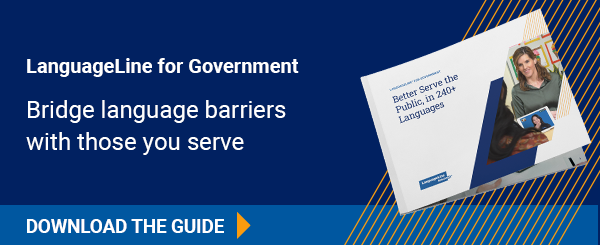
Summary:
What do recent executive orders mean for language access requirements? Despite new policies declaring English the official language, federal law—specifically Title VI of the Civil Rights Act and Section 1557 of the Affordable Care Act—still requires organizations that receive federal funds to provide meaningful access to services for individuals with limited English proficiency (LEP).
How are LEP communities being affected by federal policy changes? Limited English proficient populations are already experiencing reduced access to healthcare and public services due to budget cuts, potential Medicaid reductions, and increased immigration enforcement. These shifts are creating fear and causing many individuals to avoid seeking essential services.
What should organizations do now to stay compliant with language access laws? To remain compliant and equitable, organizations should update their language access plans, train frontline staff, use expert resources such as NHeLP and MPI, and take part in public comment opportunities that help shape future policy.

From Executive Orders to Medicaid Cuts: What’s Next for Language Access?
As federal language policies evolve and state budgets face new constraints, organizations serving individuals with limited English proficiency (LEP) are navigating fresh challenges and working to maintain access, equity, and compliance amid shifting priorities.
Two recent executive orders—one declaring English the official language of the United States, the other targeting longstanding civil rights protections—have raised fresh questions about the future of language services across health care, education, and government. At the same time, proposed Medicaid cuts and shifting immigration enforcement strategies are already reshaping the day-to-day realities for LEP communities.
To help clarify what these changes mean in practice, LanguageLine hosted a webinar, From Policy to Practice: Let’s Talk Language Access in a Shifting Federal Landscape. The conversation, featuring Mara Youdelman of the National Health Law Program (NHeLP) and Jacob Hofstetter of the Migration Policy Institute (MPI), offered critical insight into how organizations can navigate evolving expectations without compromising care or compliance.
1. Executive Orders May Shift the Tone, But the Law Hasn’t Changed
One of the most pressing questions on the minds of attendees was whether President Trump’s Executive Order 14224 declaring English the official language of the United States changes the rules for language access. As Youdelman emphasized, it does not.
“This executive order may sound sweeping, but it doesn’t repeal the fundamental protections provided under Title VI of the Civil Rights Act or Section 1557 of the Affordable Care Act,” she explained. “Entities that receive federal funds are still legally required to provide meaningful access to services for individuals with limited English proficiency.”
While the executive order revoked EO 13166—President Clinton’s directive clarifying these obligations—it explicitly states that it does not require federal agencies to discontinue translated materials or interpreter services. That said, the impact is not negligible: the Department of Justice has rescinded its LEP guidance, and other agencies may follow suit, creating a patchwork of interpretation and application.
As Hofstetter noted, “The real impact may be in tone and emphasis. When agencies are left to interpret for themselves what language access looks like, there’s a risk that they deprioritize it, especially in the absence of strong oversight.”
2. LEP Communities Are Already Feeling the Effects
Beyond legal frameworks, language access is a lifeline that is fraying in some communities.
A recent KFF Health News article highlights troubling developments: federal budget cuts have led to layoffs of community health workers in California who specialize in helping non-English speakers enroll in insurance and navigate care. Requests for interpretation services are also down, due less to a drop in need than to rising fear.
“We’re hearing from interpreters who are receiving fewer calls, not because the population is shrinking, but because individuals no longer feel safe accessing services,” Youdelman said. “And when people can’t communicate, the risk of medical errors and neglect goes up.”
The threat goes beyond health care. Hofstetter explained that Immigration and Customs Enforcement (ICE) has expanded its operational reach, rescinding past limitations on conducting enforcement in sensitive locations like hospitals and schools. This has led to a chilling effect, especially in mixed-status families, and could further erode trust in public institutions.
Meanwhile, pending Medicaid cuts could slash billions from state budgets, forcing reductions in eligibility, benefits, or reimbursement for interpreter services. This would further narrow access for LEP individuals.
“We’ve seen this before,” Youdelman warned. “People remain eligible for care, but they’re unable to overcome the paperwork, red tape, or language barriers.
3. Organizations Must Take a Proactive Role in Education and Planning
In a polarized environment, language access can be misunderstood or mischaracterized as a political issue. But as both panelists emphasized, its importance is practical, legal, and moral.
“This isn’t just about checking a compliance box,” Hofstetter said. “Language access is about making government services functional in a multilingual society. If people can’t understand how to evacuate during a hurricane or follow public health guidance during a pandemic, the whole system suffers.”
To safeguard services and uphold the law, institutions should take proactive steps now:
- Audit existing language access plans and update them based on current demographics and local needs.
- Educate frontline workers on their legal obligations and how to respond to pushback or uncertainty.
- Leverage public resources like NHeLP’s Title VI and 1557 FAQs, MPI’s reports on local and state language access policies, and peer institution models (e.g., New York City or San Francisco agency plans).
- Engage in public comment periods if regulations change, ensuring that real-world voices help shape future policies.
As Youdelman reminded attendees, language access is more than a mandate; it’s a safeguard against harm.
“It’s evidence-based, patient-centered, and cost-saving. And it’s required by law,” she said.
Final Thought: Keep the Focus on People
Language access is about real individuals who are trying to enroll in health plans, attend school meetings, fill prescriptions, or report a crime. The stakes are high, especially for those who are most vulnerable.
Even amid shifting policy, the message from both panelists was clear: language access is still the law, and it still saves lives. Now is the time for organizations to advocate for their communities and stay informed about what’s coming next.
To watch the full webinar or access related resources, please click here.
LanguageLine partners with thousands of organizations to develop compliant, effective, and culturally responsive language access programs. Contact us to explore how we can support your goals in today’s shifting environment.





